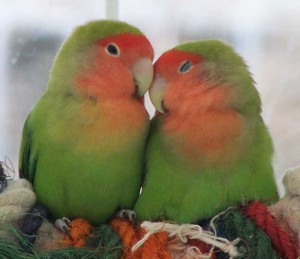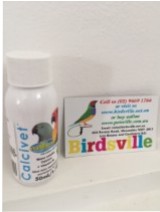Masked Lovebird for Sale Sydney
A small stocky parrot with a short, rounded tail Masked lovebirds is among the most popular pet birds worldwide. Lovebirds acquired their name because they often sit in pairs and preen each other’s feathers. But they can also be quite aggressive to each other if they have a disagreement so always watch new birds when introduced as they resident birds can be territorial.
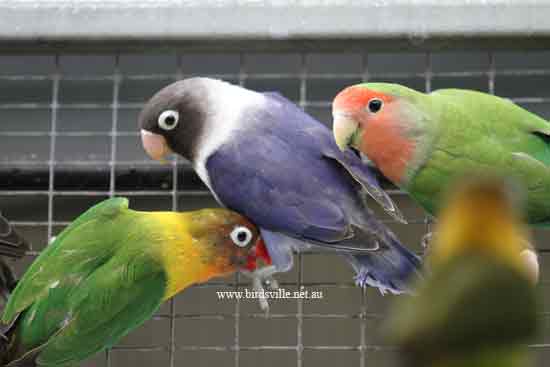
Breeding Masked Lovebirds
The most important aspect of breeding your birds is with a varied diet mentioned below.
Masked lovebirds usually will not breed until they are 11 months old the hen will lay to 8 eggs usually a day apart like most parrots the young will hatch at different times so their sizes of chicks will vary. Egg incubation usually takes 22 days. The chicks take 30 – 35 days to fledge and a further 3 weeks to fully wean onto seed. Lovebirds breed well in pairs or in colonies, it is essential to have more nesting boxes than pairs. A good size nest box should be mounted to a high section of the cage or aviary. Most pet shops will have nest boxes specially designed for lovebirds. Always make sure there is plenty of food especially when birds are breeding. Masked Lovebirds will breed all year round if allowed too. do not exhaust the hen to after she has had 3 clutches remove the nest boxes. This will ensure your birds remain happy and healthy.
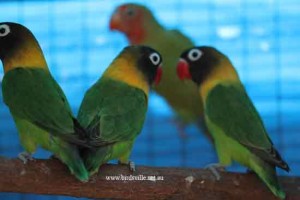
Sexing Masked lovebirds
Masked Lovebirds are monomorphic which means males and females can not be distinguished visually. If you own a lovebird and are not sure of the sex take the bird to your local bird specialist and they will see the bird via the pelvic bone this is not 100 % but it is very effective in choosing pairs.
Bathing
Masked lovebirds love to have a bath so a shallow bowl of water should be provided
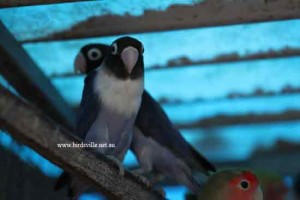
Diet for Masked Lovebirds
Seed– Because seed is a large part of the diet, you should feed them a good quality seed mix available from most pet shops or produce stores. Be wary of some supermarket mixes as the contain filler seed and have seed which is not as fresh.
Pellets– Masked lovebirds will also happily eat pellets which can be supplied either with seed or in a separate bowl. Add vitamins to the water most pellets have a vitamin added so if pellets are supplied this is not necessary. I have found Kaytee pellets is relished by Lovebirds, vetafarm is also a great pellet.
Sprouted seed– A great way to get your birds to have extra vitamins and greens which is relished by all lovebirds. Make you clean your sprouted seeds with aviclens before feeding to your birds to remove any bacteria.
Millet sprays– A fresh millet still on the stem is a great supplement and the freshest seed available we recommend offering French white millet sprays.
Fruits– such as Rock melon, apple, stone fruit, guava, fig to name a few. This should be offered to your Masked Lovebirds once in a while.
Vegetables and greens– should be added regularly such as apple, carrot, rock melon, green peas, broccoli, spinach, chick weed, milk thistle, dandelion and fresh seeding grasses, always make sure everything fed is not sprayed with pesticides.
Egg and biscuit formula– Great protein source especially for breeding birds. Some people add some boiled egg to the egg and biscuit formula.
Calcium– Always make sure there is a supply of calcium available at all times. calcium can be supplied with a cuttlebone or calcium bell. Unfiltered sunlight is essential for all birds to receive vitamin d for them to be able to absorb calcium. Do not supply calcium for your birds in the birds seed.
Vitamin D-. If unfiltered sunlight is not possible then add vitamin d to the drinking water which is available at birdsville.
Vitamin supplement– An important addition for your birds’ dietary requirements, vitamins should only be added via the water supply and not in the seed to ensure your birds ingest the vitamins supplied. Vitamins do not need to be given to birds that are fed pellets.
Fresh drinking water– must be available at all times.
Medicating your birds.
Stress– Sulfa aid, sulphadim or sulfa 3 When purchasing a new bird, or introducing a new bird or during and after heavy rain in an aviary or having a bird which has a case of diarrhea this should be supplied to your birds for at least 5 days. This product is magic and can save your birds life.
Worming your birds – This is done every 3 months for birds kept in an outdoor environment and every 6 months for birds that are kept inside. Worming couldn’t be easier as it is simply placed in the water with dosage rates on the bottle of wormer you are using. Hint purchases an all wormer as there are different bird wormers as many worming syrup will not kill tape worm.
Mite and lice spray– Just as common as fleas on dogs and is very easily done by spraying under the wings around the birds behind. Do not spray your bird in the face as your bird may lose respect for you as this can cause discomfort for your lovebirds’ eyes.
Antibiotics– To be used if you have a sick bird which has picked up a nasty bug or bacteria. Your first line of defense is using a broad-spectrum antibiotic such as tripple c or avicycline. This has proved very effective in saving many of my birds over the years, but you must keep your birds warm such as heat globe, heater or heat pad while using the antibiotics.
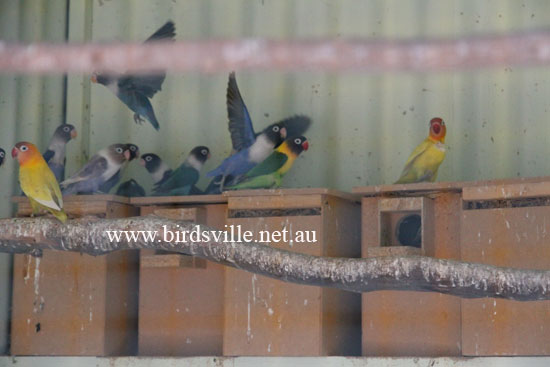
Toys
These intelligent little birds love swings, bells and chew toys
One of the 2 birds with the lighter head looks like a hybrid between a fischer and a Masked lovebird.

